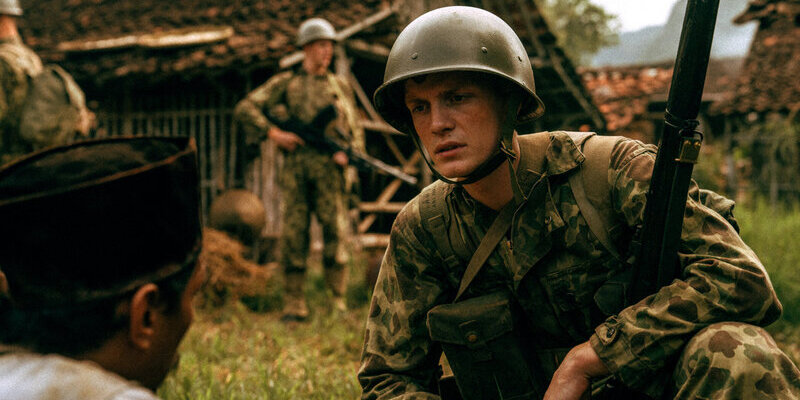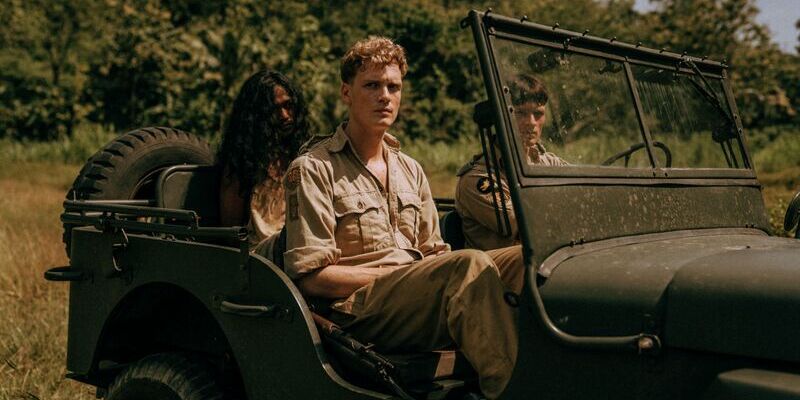
A young Dutch soldier questions his role in the crushing of a rebellion
when he is assigned to a squad led by a brutal captain.
Review by
Benjamin Poole
Directed by: Jim Taihuttu
Starring: Martijn Lakemeier, Marwan Kenzari, Jonas Smulders, Joes Brauers

As an archipelago with lucrative spice and cash crop potentials,
seventeenth century Indonesia was a territory ripe for Western
colonisation. Recognised as the Dutch East Indies from 1603 (the
appellation Indonesia was only ‘officially’ accepted in 1949), during
this era of European rule the indigenous people made certain moves
towards independence. Limited emancipation was granted much later by the
Japanese occupation of the Dutch East Indies during World War II -
where, due only to the internment of Dutch citizens, Indonesian people
held administrative positions. History records the Pacific War years as
an especially brutal time for Indonesia however, with a UN report
stating that four million people died as a result of the occupation.
Nonetheless, due to the relatively influential positions which the
Indonesian people held during the Japanese occupation, and the ongoing
global instability, nationalist leaders Sukarno and Mohammad Hatta
declared Indonesian independence in 1945 following the Japanese
surrender.

For the Dutch, who were of course themselves invaded and occupied by the
Nazis over the previous five years, the ensuing decision to violently
re-establish their colony is one of those mordant paradoxes which
characterise international policies, and proves inconvenient to accepted
historical narratives. Jim Taihuttu’s (with writing duties shared
with Mustafa Duygulu) The East has apparently met
controversy in The Netherlands due to its portrayal of Dutch soldiers in
this post-Pacific War set drama, but even cursory research reveals a
pestiferous truth at the heart of its representations.
When information is controlled, nothing is clear cut. And perhaps, then,
we can understand why wide-eyed Johan de Vries (Martijn Lakemeier
- the Milky Bar kid all grown up) has volunteered to support the Dutch
cause in Indonesia: the country is being run by guerrilla freedom
fighters, the Japanese occupation was savage, and, unbeknownst to
others, de Vries has red in his ledger as his father was a member of a
pro-Nazi organization in the Netherlands. De Vries is our fresh-faced
Charlie Sheen epxy, habitually shocked by the (specifically) limited
violence in the first half of the film, and cutely handing out biscuits
to the local kids. And, as ever watching a period war film, the further
away from the events depicted the film is, the more the audience may
wonder how much of the representation is a sincere attempt to honour
history and how much is propped up by common tropes of the genre: the
goof who carries porn mags in his fatigues - ‘the library is open’ - the
montage of lads on the town enjoying the local colour of moonshine and
sex workers, the tentative male bonding.

However, a unique aspect of The East is its beautifully
verdant locations and the expressive use of these tropical forests. In
these lush, open spaces the very concept of violence seems absurdist,
and, congruously, the film refrains from combat sequences: an absence
which is tellingly felt by an audience conditioned to expect such
conflict from The East’s window dressing of war iconography. Instead, there is simply the
march through a humid pastoral, with occasional spurious searches of
villages for supposed dissidents: Truffaut’s supposed adage about there
being no such thing as an anti-war film does not apply here. In all this
space, a just-about man could lose himself, and may need a focal point.
Enter Westerling (Marwan Kenzari), a charismatic ideologue army
captain (Westerling was a real-life figure who was so committed to the
acts of violence and sadism which his appointment as a soldier enabled
him to enact that he wrote a book boasting about them and also appeared
on television bragging about how many people he had killed - it is worth
noting that Westerling was, for whatever reason, never charged with war
crimes by the Dutch). Inevitably, young de Vries’ head is turned by ‘The
Turk’s radical ideologies and links to high society.

What follows is an enactment of Westerling’s ‘counter insurgency’, a
cold-blooded series of executions taking place in unarmed villages,
aided by de Vries and the rest of Westerling’s green beret company. This
visceral realisation of the banality of evil is interspersed with a
fictionalised account of the now wall-eyed de Vries post war, haunted by
his experiences and determined to track down Westerling. A wish
fulfilment ending may satisfy the requirements of narrative closure, and
redeem the actions of a cowardly character, but the strangely pat
conclusion of The East (compounded by the closing credit’s
choice of music) seems disingenuous to the thousands of Indonesian
deaths Westerling was responsible for.

The East is on Prime Video UK
now.
